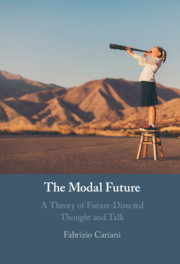
-
Select format
-
- Publisher:
- Cambridge University Press
- Publication date:
- June 2021
- July 2021
- ISBN:
- 9781108668514
- 9781108474771
- 9781108465472
- Dimensions:
- (229 x 152 mm)
- Weight & Pages:
- 0.61kg, 320 Pages
- Dimensions:
- (229 x 152 mm)
- Weight & Pages:
- 0.47kg, 320 Pages
You may already have access via personal or institutional login
Book description
It is commonly assumed that we conceive of the past and the future as symmetrical. In this book, Fabrizio Cariani develops a new theory of future-directed discourse and thought that shows that our linguistic and philosophical conceptions of the past and future are, in fact, fundamentally different. Future thought and talk, Cariani suggests, are best understood in terms of a systematic analogy with counterfactual thought and talk, and are not just mirror images of the past. Cariani makes this case by developing detailed formal semantic theories as well as by advancing less technical views about the nature of future-directed judgment and prediction. His book addresses in a thought-provoking way several important debates in contemporary philosophy, and his synthesis of parallel threads of research will benefit scholars in the philosophy of language, metaphysics, epistemology, linguistics and cognitive science.
Reviews
The Modal Future succeeds in both being rigorous and highly readable. Cariani employs a careful methodology, drawing distinctions between various issues and theses that are oftentimes conflated or overlooked in the literature. The rich argumentation adeptly integrates insights from linguistics, metaphysics, and epistemology, making substantial contributions to recent debates concerning the open future, assertion, prediction, foreknowledge, and also providing a novel and attractive account of the semantics of future discourse.
Stephan Torre - University of Aberdeen
Contents
Metrics
Full text views
Full text views help Loading metrics...
Loading metrics...
* Views captured on Cambridge Core between #date#. This data will be updated every 24 hours.
Usage data cannot currently be displayed.
Accessibility standard: Unknown
Why this information is here
This section outlines the accessibility features of this content - including support for screen readers, full keyboard navigation and high-contrast display options. This may not be relevant for you.
Accessibility Information
Accessibility compliance for the PDF of this book is currently unknown and may be updated in the future.


